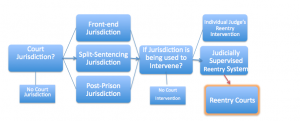Oct. 27, 2014
Front End Reentry Courts, Pre-Entry Courts or Early Intervention Courts are a hybrid response to long prison sentences. They allow offenders to avoid long prison sentences by completing a short term in a prison rehabilitation program (and in some cases jail or community corrections programs), to return to their communities to be supervised by the same court that sentenced them.
It is often thought that the court’s have little recourse or jurisdiction to affect a prison sentence once that sentence has been announced. The truth is, that most state courts have significant jursdiction to alter, amend or modify a prison sentence. Depending on the state, jurisdiction to recall may exist for a period of one month to one year after sentencing.The most obvious purpose of a “front-loaded intervention”, is to order a convicted felon to state prison for an evaluation, assessment, or other purpose, immediately before or after sentence has been imposed
Jjurisdiction exists in many states to recall the felon, after sentencing, for re-consideration and potential re-sentencing. The intention to recall may be announced at the time of sentence, or the decision to recall may be discretionary with the judge within the statutory period. This form of pre-entry intervention is often used to encourage a serious attitude change on the part of a prospective long-tern prisoner.
While this power is found in most state courts, it is most often used by individual judges on a case by case basis. Some courts, in particular drug courts, will use front-loaded jurisdiction to create what can be called a “court-based reentry system” (often described as a Pre-entry Court). The judge may use their jurisdiction to sentence the felon to prison as part of a court-ordered treatment program, with the understanding that the offender is to undergo treatment before returned to court for re-sentencing. If the felon is found in compliance, the court will return the felon to a court-based probation program in the community.
The above are just some of the existing variations in the courts’ use of a brief and immediate prison term, to be followed by recall to the court for sentencing or reconsideration of a sentence previously imposed. They are considered here because they are generally thought of as a successful rehabilitation strategy, designed to get the offender’s attention, assess their suitability for probation, and give them one last chance to change their behavior before a substantial prison sentence is imposed. It should be seriously considered on the program level as an alternative to prison, and as a way to reach out to large numbers of offenders that otherwise would be on their way to long prison terms.
………………………………………..


